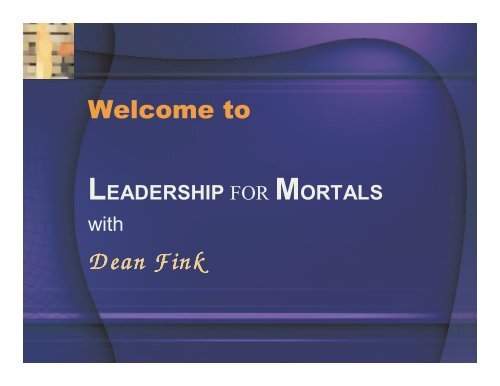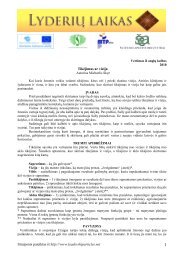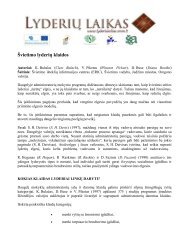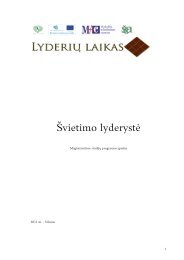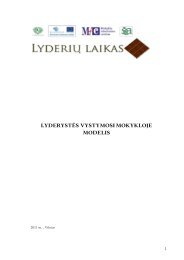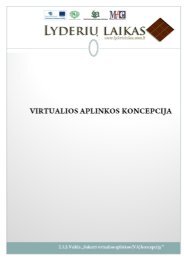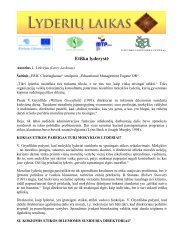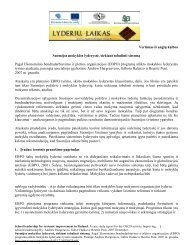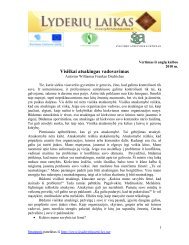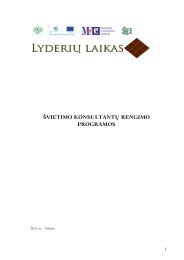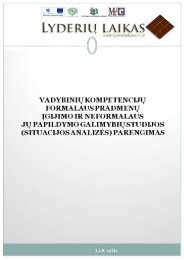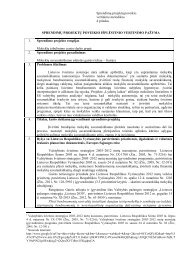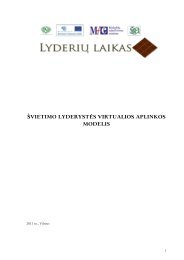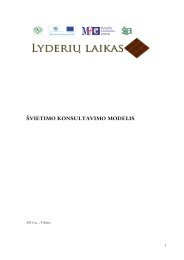Dean Fink
Dean Fink
Dean Fink
Create successful ePaper yourself
Turn your PDF publications into a flip-book with our unique Google optimized e-Paper software.
Welcome to<br />
LEADERSHIP FOR MORTALS<br />
with<br />
D ean F ink
Heroic leaders?
Heroic leaders?<br />
Leadership in recent years has become a<br />
growth industry. Politicians demand<br />
more of it, academics decry the lack of it,<br />
and potential school and district leaders<br />
are deciding ‘to hell with it’. I would<br />
submit that we are making the business<br />
of leadership so complicated that we<br />
seem to need a super hero to run a school.
Disenchantment &<br />
Demographics<br />
A combination of disenchantment with<br />
leadership roles as a result of the<br />
standards/standardisation agenda, and<br />
demographic changes as the baby boom<br />
generation moves on, have produced, and<br />
will continue to produce, a rapid turnover<br />
of school heads and other educational<br />
leaders in the schools of most Western<br />
educational jurisdictions
Leadership is Important<br />
Our conclusion . . . is that leadership has very<br />
significant effects on the quality of school<br />
organisation and on pupil learning. As far as we<br />
are aware, there is not a single documented case<br />
of a school successfully turning around its pupil<br />
achievement trajectory in the absence of<br />
talented leadership. One explanation for this is<br />
that leadership serves as a catalyst for<br />
unleashing the potential capacities that already<br />
exist in the organisation.”<br />
Leithwood, K, Day, C. Sammons, P., Harris, A., and Hopkins, D. (2008).
Four ‘Layers’ of Knowledge<br />
1. knowledge of the substance/subject matter: What<br />
the work is about?<br />
2. knowledge of how to facilitate the learning: The<br />
how of the work?<br />
3. knowledge of how teachers learn to teach and<br />
how others can assist their learning: The how of<br />
learning for the previous two layers.<br />
4. knowledge of how to guide the learning of other<br />
adult professionals: The how of learning for the<br />
previous three layers.<br />
Stein, M.K. & Nelson, B.S. (2003)
Leadership for Mortals<br />
Challenge
What doesn’t change<br />
• Commitment<br />
• Values<br />
Challenge
What must change<br />
• Qualities<br />
• Learnings<br />
• Trajectories<br />
Challenge
PETER DRUCKER<br />
Do you know what<br />
business you‘re in?
Leaders of learning<br />
are ordinary people who, through<br />
extraordinary commitment, effort,<br />
and determination, have become<br />
extraordinary and have made the<br />
people around them exceptional.<br />
Summary
Commitment
Commitment to what?<br />
• Test scores ?<br />
• inspection reports ?<br />
• Short term achievement targets ?<br />
• Reputation ?<br />
• Customer satisfaction?<br />
Commitment
Educational leadership<br />
is about a passionate, steadfast,<br />
obstinate commitment to the<br />
enhancement of ‘deep’ learning for<br />
all students – learning for life,<br />
learning for understanding, learning<br />
for an increasingly fluid, messy and<br />
risky world.<br />
Commitment
DEEP LEARNING
The two hungers<br />
In Africa, they say there are two<br />
hungers, the lesser hunger and the<br />
greater hunger.<br />
The lesser hunger is for the things that<br />
sustain life, the goods, and services,<br />
and the money to pay for them, which<br />
we all need.
Left Brain Thinking<br />
Any job that depends on<br />
routines - that can be reduced<br />
to a set of rules, or broken down<br />
into a set of repeatable steps –<br />
is at risk.<br />
Daniel Pink - A Whole New Mind
We need<br />
• Creativity<br />
• Imagination<br />
• Diversity<br />
• Innovation<br />
• Agility<br />
• Passion<br />
• Entrepreneurialism<br />
• Failure (to try)<br />
• Questions<br />
• Nonconformity<br />
• Trust<br />
Commitment
Present education delivers<br />
• Predictability<br />
• Control<br />
• Compliance<br />
• Conformity<br />
• Stability<br />
• Order<br />
• Answers<br />
• Apathy<br />
• Distrust<br />
• Standardization<br />
Commitment
Standards and Sustainability<br />
FROM<br />
Testing Achievement Learning<br />
TO<br />
Learning Achievement Testing<br />
Hargreaves & <strong>Fink</strong>, 2006<br />
1. Depth
What Matters ?<br />
•What does the focus on standardized<br />
outcomes determined by external (to schools)<br />
testing actually stand for and thus do they<br />
represent valid, worthwhile or meaningful<br />
outputs?<br />
•Does increased emphasis on preparation for<br />
the tests and the adaptation of teaching and<br />
curriculum to the requirements of test<br />
performance constitute worthwhile effects of<br />
‘improvement’?<br />
•In terms of economic competitiveness, is<br />
what is measured here what is needed?<br />
Stephen Ball, The Education Debate
The Accountability Question<br />
Do we evaluate what we value<br />
or<br />
do we value what we evaluate?
Going deeper<br />
The greater hunger is for the answer to<br />
the question ‘why’, for some<br />
understanding of what life is for.<br />
Handy, C. (1997). The Hungry Spirit. London: Hutchison, p.13.<br />
Commitment
Deep learning<br />
• Our educational system does its best to ignore and<br />
suppress the creative spirit of children.<br />
• It teaches them to listen unquestioningly to authority.<br />
• It insists that education is just knowledge contained<br />
in subjects and the purpose of education is to get a<br />
job.<br />
• What’s left out is sensitivity to others, non-violent<br />
behaviour, respect, intuition, imagination, and a<br />
sense of awe and wonderment.<br />
The Body Shop<br />
Commitment
Five pillars of learning<br />
• Learning to know*<br />
• Learning to do*<br />
• Learning to live together*<br />
• Learning to be*<br />
• Learning to live sustainably<br />
*UNESCO Learning: The Treasure Within, 1996.<br />
Commitment
Broad Learning
Breadth- Queensland<br />
Old basics<br />
• Numeracy<br />
• Literacy<br />
• Obedience<br />
• Punctuality<br />
New basics<br />
• Multiliteracy<br />
• Creativity<br />
• Communication<br />
• Info.Technology<br />
• Teamwork<br />
• Lifelong Learning<br />
• Adaptation & Change<br />
• Environmental<br />
Responsibility<br />
1. Depth
Learning that Lasts
Slow Knowing<br />
The unconscious realms of the human<br />
mind will successfully accomplish a<br />
number of important tasks if they are<br />
given the time. They will learn patterns of<br />
a degree of subtlety which normal<br />
consciousness cannot even see; make<br />
sense out of situations that are too<br />
complex to analyze; and get to the bottom<br />
of certain difficult issues much more<br />
successfully than the questing intellect.<br />
Claxton 1997
What does the doctor reply?<br />
1. Depth
Slow forms of knowing<br />
• are tolerant of the faint, fleeting, marginal and<br />
ambiguous<br />
• like to dwell on details that do not fit or<br />
immediately make sense<br />
• are relaxed, leisurely and playful<br />
• are willing to explore without knowing what they<br />
are looking for<br />
• see ignorance and confusion as the ground from<br />
which understanding may spring<br />
• are receptive rather than proactive<br />
• are happy to relinquish the sense of control over<br />
the directions the mind spontaneously takes<br />
• treat seriously ideas that come ‘out of the blue’<br />
Claxton, 1997
Does this policy, practice,<br />
custom, or decision contribute<br />
to ‘deep’, wide and slow learning<br />
for all students?<br />
Commitment
Learnings
Leadership for learning<br />
• Leadership for learning is not a destination<br />
with fixed coordinates on a compass, but a<br />
journey with plenty of detours and even some<br />
dead ends.<br />
• Effective educational leaders are<br />
continuously open to new learning because<br />
the journey keeps changing. Their maps are<br />
complex and can be confusing.<br />
continued…<br />
Learnings
Leadership for learning<br />
• What leaders require for this journey is a set<br />
of interrelated learnings that look at school<br />
leadership in a holistic rather than<br />
reductionist way.<br />
• These learnings can be deepened,<br />
elaborated, nurtured, abandoned, and<br />
connected and related to other learnings as<br />
the journey progresses.<br />
Stoll, <strong>Fink</strong> & Earl (2002)<br />
Learnings
Leaders’ learnings<br />
• Understanding learning<br />
• Contextual knowledge<br />
• Critical thinking<br />
• Futures thinking<br />
• Political acumen<br />
• Emotional understanding<br />
• Making connections<br />
Stoll, <strong>Fink</strong> & Earl (2002)<br />
Learnings
Page 39<br />
Leaders of learning<br />
are ordinary people who, through<br />
extraordinary commitment, effort, and<br />
determination, have become<br />
extraordinary and have made the<br />
people around them exceptional.<br />
Summary
Page 39<br />
Educational leadership<br />
• is more art than science<br />
• is more about character than technique<br />
• is more about inspiration than charisma<br />
• is more about leading students and<br />
teachers’ learning than the<br />
management of things.<br />
Summary
Page 39<br />
Leaders<br />
must be passionately, creatively,<br />
obsessively and steadfastly committed<br />
to enhancing ‘deep’ learning for<br />
students – learning for understanding,<br />
learning for life, learning for a<br />
knowledge society.<br />
Summary
Learning from Noah’s Ark<br />
1 Don’t miss the boat<br />
2 Remember we’re all in the same boat<br />
3 Plan ahead. It wasn’t raining when Noah<br />
built the Ark<br />
4 Stay fit. When you’re 600 years old,<br />
someone may ask you to do something<br />
really big<br />
5 Don’t listen to critics; just get on with the job that<br />
has to be done
Learning from Noah’s Ark<br />
6 Build your future on high ground<br />
7 For safety’s sake, travel in pairs<br />
8 Speed isn’t always an advantage;<br />
the snails were on board with the cheetahs<br />
9 When you’re stressed, float awhile<br />
10 Remember the Ark was built by amateurs,<br />
the Titanic by professionals
11 No matter the storm,<br />
there’s always a rainbow<br />
waiting
The woodpeckers may have<br />
to go
FOR FURTHER INFORMATION SEE:<br />
<strong>Fink</strong> D. (2005).Leadership for Mortals:<br />
Developing and Sustaining Leaders of learning<br />
London: Paul Chapman/Corwin.<br />
Hargreaves A. & <strong>Fink</strong>, D. (2005)<br />
Sustainable Leadership. San Francisco, CA:<br />
Jossey-Bass.<br />
Stoll, L, <strong>Fink</strong>, D. & Earl, L (2003).<br />
It’s about Learning and It’s about Time.<br />
London: Taylor Francis.
CORWIN


